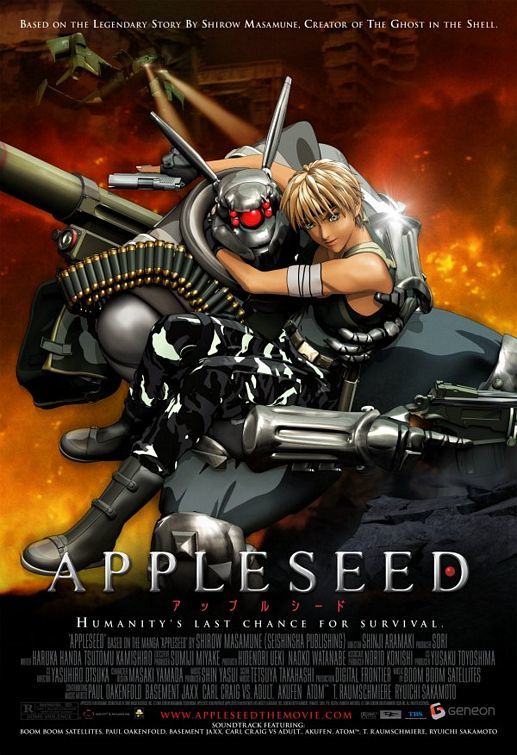
*This Appleseed movie review is the second of four that I will be doing for the month. For a small primer on the comic series, check out my Appleseed Month announcement here*
My first memories of this Appleseed movie are hazy at best. I remembered that I was roughly ten and that I first watched it in Cantonese. It had robots, explosions, and a cool action girl as its lead. The box that contained the DVD was shiny, if I recall. And although the movie came and went without making an impression on me, I was intrigued enough to (casually) follow the series in my adolescence. I tracked down its sequel movies and occasionally checked up on its Wikipedia page to see what was next for Masamune Shirow's creation.
Now I have returned to the work that first introduced me to Deunan, Briareos, their world and their friends. Could the 2004 Appleseed movie (hereafter abbreviated in this post as Appleseed 2004) better than I thought it was as a ten-year-old?
Plot
The movie begins in a war zone, where soldier Deunan Knute is fighting for survival. She and her comrades battle a small platoon of cyborgs, with most of the casualties falling on her side. Before the robots can claim total victory, a third army intervenes and defeats the cyborgs. It also captures Deunan and transports her to Olympus, a technologically advanced city that governs whatever remains of the war-torn world.
After awakening in an Olympus medical facility, Deunan reunites with Briareos, her former lover who turned into a cyborg after suffering fatal injuries a year ago. Hitomi, a government official, also helps Deunan catch up to recent events. Deunan learns that Olympus brought her in to be a soldier that will keep the peace between humans and Bioroids, artificial humans who run the city's government. To fulfill this role, she trains with her new ESWAT police colleagues and their advanced weaponry. But then, on her first day on the job, a group of human terrorists infiltrated and destroyed Olympus' Bioroid care center. With that facility in ruins, all Bioroids (like Hitomi) will soon age rapidly and die off.
To ensure the Bioroids' survival, Prime Minister Athena instructs ESWAT to find Appleseed, a computer program that activates the Bioroids' reproductive capabilities and extends their lifespans. Deunan, Braireos and some other soldiers fly to a secret lab to begin their mission. There they discover that the programme came from Deunan's mother and that it was inside the handgun of Deunan's late father. But before they can return home, the all-human (and anti-Bioroid) Olympus Regular Army arrives and intercepts them. Briareos almost dies in the battle, but Deunan manages to flee to Olympus and activate the Appleseed programme.
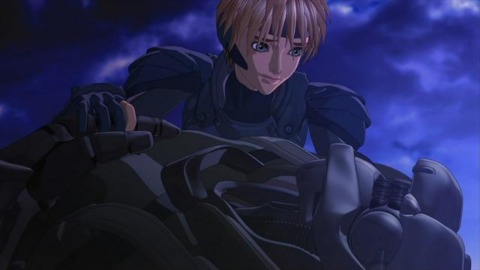
But the story is not yet over. Deunan discovers that Olympus' Elders wanted Appleseed for their own nefarious plans to destroy humanity. They activate the city's mobile towers and direct them to the Tartarus building. If the complex falls, its destroyed D-Tank will spread a virus that will render all humans infertile. So with a recovered Briareos, Deunan made her way to the seventh tower while the rest of ESWAT laid covering fire for them. On the tower, she typed out a password that deactivates all the towers right before they destroy D-Tank.
After the battle, Deunan reunites with Briareos and Hitomi. Large parts of Olympus now lay in ruin, but Deunan pledges to fight for future generations of humans, Bioroids, and cyborgs who will rebuild the city and create from it a more peaceful and just society.
Analysis
Appleseed 2004 is a passable sci-fi action flick.
Even after 14 years, the movie's graphics are incredible. Everything looks shiny and new. I especially enjoyed the sweeping shots of the Olympus skyline punctuated by the Tartarus and Daedalus complexes and their solar panel arches. The roads, adorned with a panoply of hi-tech vehicles, are squeaky clean and reflective of light. And like the Landmates from the 1988 movie, the piloted mechs have a sheen balanced with a striking color scheme of white and blue. So when Hitomi claims that Olympus is a utopia, one is hard-pressed to disagree with her. The only real gripe I have concerns the human character models. They are cel-shaded and thus clash up against the rest of the movie's aesthetics. When they are in a nighttime scene or a dark room, I cannot shake the feeling that the shadows on the humans are either too dark or too light relative to the rest of the setting. I could also do without some of the slo-mo since the actions that were slowed down for dramatic effect were not that awesome. But despite these particular flaws, I still found Appleseed 2004's presentation to be artistic and pleasing to the eye.
The worst part of the movie is its story. I get the moral that Appleseed 2004 is trying to teach to its audience: hating Bioroids (the stand-in for people who are not like you) is not good, yet hating humanity is also not good. The problem is that these two groups are hardly in conflict at all. Yes, we do have an openly bigoted group in the Olympus Regular Army, but the other humans in the movie are coexisting with their Bioroid neighbors without incident. ESWAT itself seems to be a hodgepodge group that gets along swimmingly. Furthermore, when the human terrorists destroyed the Bioroid care center, no one else took up arms to overthrow their artificial masters. The movie could have pushed its themes better by focusing on the genuine hurdle that humans cannot serve in the Olympus government given their (supposed) judgment-clouding emotions. One can imagine resentment amongst humans who have the skills to be administrators. But given that the Olympus Regular Army wants to rectify this problem through a violent coup, the audience has no choice but to side against it. The larger question of who can access power, or how one can find the people who can wield power responsibly, buries itself under the hail of bullets, shrapnel, and broken Landmates.
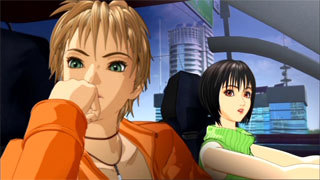
The characters are just OK. While they are leagues ahead of their 1988 iterations, on the strength of their non-stupidity, they still don't have any discernable character arcs. Deunan and Briareos are at their best when they shut up and do action hero things: firing their weapons while on the move, running away from gunfire, darting around giant mobile fortresses while in their Landmates and so on. Briareos' moment of awesome comes from winning a fight against a trio of fembot assassins (video above). Deunan also has her moment in an ESWAT training exercise where she singlehandedly defeats 16 soldiers without a firearm to start. To be fair, the characters do occasionally show off other sides of their personalities, but those moments are minimal and out of focus.
Deunan has a lot of things going for her character, but she mostly stays the same throughout the movie. She does show signs of difficulty in adjusting to her life in Olympus, and that struggle does make sense. After all, the habits she formed while surviving in a war zone now need to be unlearned or modified in an affluent and hi-tech city. Hell, just living in a house with running water, lights and comfy furniture alone will take some getting used to. Deunan best shows this alienation from the amenities we take for granted by laying on a bed for the first time in eons, only to later park herself on the bedroom floor and sleeping soundly there. She also shows some sign of distance towards her new colleagues at ESWAT when going out with them at a bar, which is understandable given that she just started working there. But these quirks do not affect her much. The rest of ESWAT treat her like one of the guys, and sleeping on the ground did not affect her ability to be the badass she already was at the start of the movie.
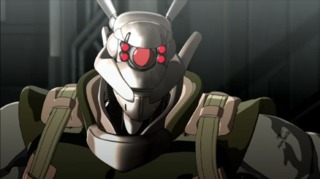
Although movie posters and DVD box arts depict Briareos as one of the movie's protagonists, he plays a less central role in the story. He's the strong, silent, and stoic type, a complete departure from his hammier 1988 counterpart. If he has a character arc, it has to do with resetting his relationship with Deunan. He initially acts coldly towards her for no apparent reason, but that comes from his divided loyalties between her and the Elders who were responsible for his life-saving cyborg transformation. He knew of Appleseed from the start, and he deliberately allowed the terrorists to destroy the Bioroid care center to force ESWAT to look for the program. He later proves his love for Deunan by protecting her against the Olympus Regular Army, almost at the cost of his own life. Then once the Elders turned out to be genocidal, Briareos' inner conflict easily resolves itself, and his relationship with Deunan approaches its romantic status quo. Sad to say, I did my best to ignore whatever character development Briareos had in the movie. I just found it to be too convoluted. I think his initial distance from his lover should have had a more simple explanation, like adjusting to his life as a cyborg.
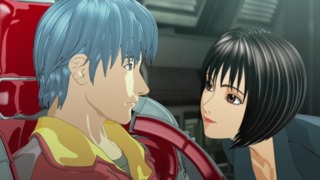
Hitomi doesn't do much in the story, but I found her interesting to some extent. Her primary purpose in the movie is to help Deunan, and the audience, get up to speed by providing exposition about Olympus and the politics surrounding it. And as a Biodroid she believes that her programmed and limited range of emotions is what helps her city remain stable. But I also think she goes beyond her programming in her own small way. Just before the halfway point, the Elders remind her to do her routine lifespan extension at Tartarus. Then later at the bar, Hitomi confides in Deunan that she was interested in feeling love, an emotion beyond her reach. My wacky theory is that she was secretly attempting to loosen Gaia's restrictions on her emotional range by intentionally delaying her checkups. Only then could she know the meaning of love, and experience her humanity away from surveillance. Now, I wish that she did a bit more to earn that humanity (instead of having it provided to her through Appleseed). But I guess she proved herself useful by recovering from her near-death experience and telling Deunan how to stop the incoming mobile fortresses.
Conclusion
So in the end, the 2004 Appleseed movie has exceptional visuals, middling characters, and an unwieldy story. It is much better than the 1988 OVA, and I also think it is better than the 24% score given to it by Rotten Tomatoes. If I had to put a number on it, my proposed score would be something between 40 and 50 percent. I would recommend watching the movie once, and not taking the movie's overarching themes all that seriously. Make sure you also recite the Mystery Science Theatre 3000 Mantra throughout, audibly or otherwise.
My review for Appleseed Ex Machina, the sequel to Appleseed 2004, will be up next week on June 18.
Log in to comment